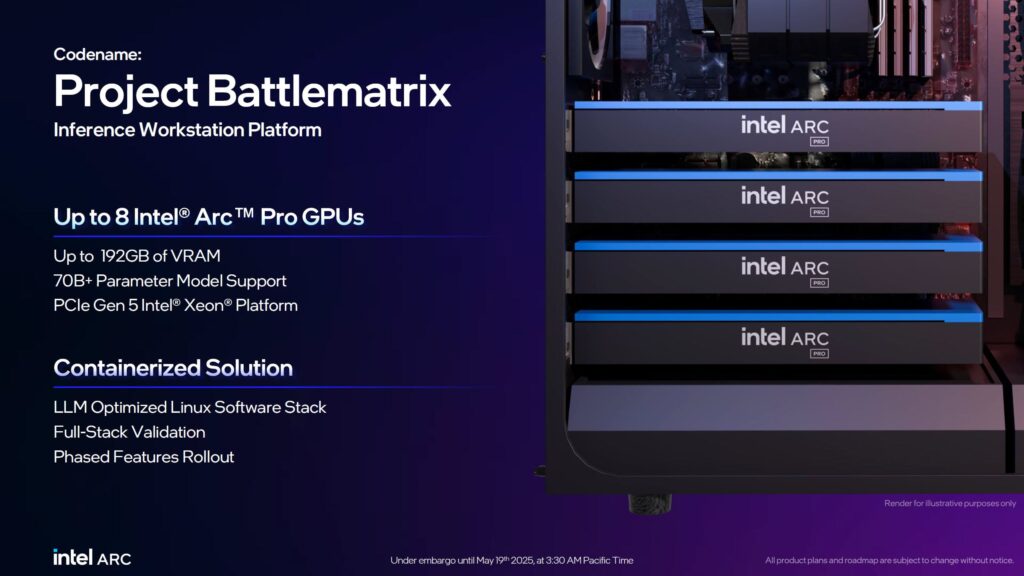Intel has taken a significant step in its strategy to establish a foothold in the enterprise AI market with the release of LLM Scaler v1.0, the first major software update for Project Battlematrix. The new version promises performance improvements of up to 80%, specific optimizations for large language models (LLMs), expanded support for multimodal AI, and new business management tools.
Available on GitHub → https://github.com/intel/llm-scaler/releases/tag/vllm-1.0
Presented at Computex 2025, Project Battlematrix was designed as a comprehensive solution for AI inference in workstation and multi-GPU environments based on Intel Arc Pro. Intel committed to launching a third-quarter “Inference Optimized” container supporting vLLM, basic telemetry, and simplified management.
With LLM Scaler v1.0, that milestone has been achieved, incorporating:
- Optimized multi-GPU scaling for demanding inference environments.
- P2P PCIe transfers that reduce latencies and improve efficiency.
- Enterprise reliability features such as ECC, SR-IOV, advanced telemetry, and remote firmware updates.
Key enhancements in LLM Scaler v1.0 include:
The container, optimized for Linux and industry standards, offers significant advances in performance and management:
vLLM Optimization
- Accelerated TPOP for long sequences (>4K), with up to 1.8× performance on 32B KPI models and up to 4.2× on 70B models (40K tokens).
- +10% performance on 8B to 32B models compared to the previous version.
- Online per-layer quantization, drastically reducing GPU memory consumption.
- Experimental support for pipeline parallelism (PP), torch.compile, and speculative decoding.
- Compatibility with embedding and reranking models.
- Expanded support for multimodal models.
- Automatic detection of maximum length and data parallelism.
XPU Manager
- Real-time GPU power consumption monitoring.
- GPU firmware updates directly from the management environment.
- Advanced diagnostics and memory bandwidth testing.
Benchmarking Tools
- OneCCL benchmark tool for performance testing in distributed and multi-GPU environments.
Intel claims that LLM Scaler v1.0 delivers up to 80% performance gains thanks to optimized multi-GPU scaling and improved data transfer between devices. This positions Project Battlematrix as a competitive alternative for workloads involving large-scale LLMs, especially in enterprise settings where cost and energy consumption are critical factors.
Intel’s roadmap for Project Battlematrix outlines three phases:
- Q3 2025 — “Inference Optimized” container (already available with LLM Scaler v1.0).
- Late Q3 2025 — A more robust version with additional performance improvements and vLLM service enhancements.
- Q4 2025 — Full release with all planned functionalities.
With this launch, Intel aims to compete directly with NVIDIA and AMD ecosystems by offering a more affordable option for professional inference environments that do not require data center GPUs like NVIDIA H100 or AMD Instinct MI300.
Target audiences include:
- Corporate data centers with space and energy constraints.
- Research labs developing and refining AI models.
- High-performance workstations for engineering, data science, and design.
Beyond performance, Project Battlematrix integrates management and monitoring tools enabling IT departments to maintain granular control over AI infrastructure. This includes remote management, secure updates, and resource optimization to maximize hardware ROI.
Intel envisions LLM Scaler as the core of an open ecosystem that allows modular scaling of AI solutions, from individual workstations to distributed enterprise clusters.
FAQs
What is Project Battlematrix?
It is Intel’s platform for optimizing AI inference on multi-GPU setups with Arc Pro, designed for enterprise and scientific use.What improvements are included in LLM Scaler v1.0?
Performance increases of up to 80%, memory usage optimization, enhanced multimodal AI support, and experimental parallelism and decoding techniques.Where can I download it?
It is available on Intel’s official GitHub repository: LLM Scaler v1.0.Is this an alternative to NVIDIA and AMD?
Yes, it aims to compete in the professional segment by offering a better balance of cost, energy efficiency, and management capabilities.

